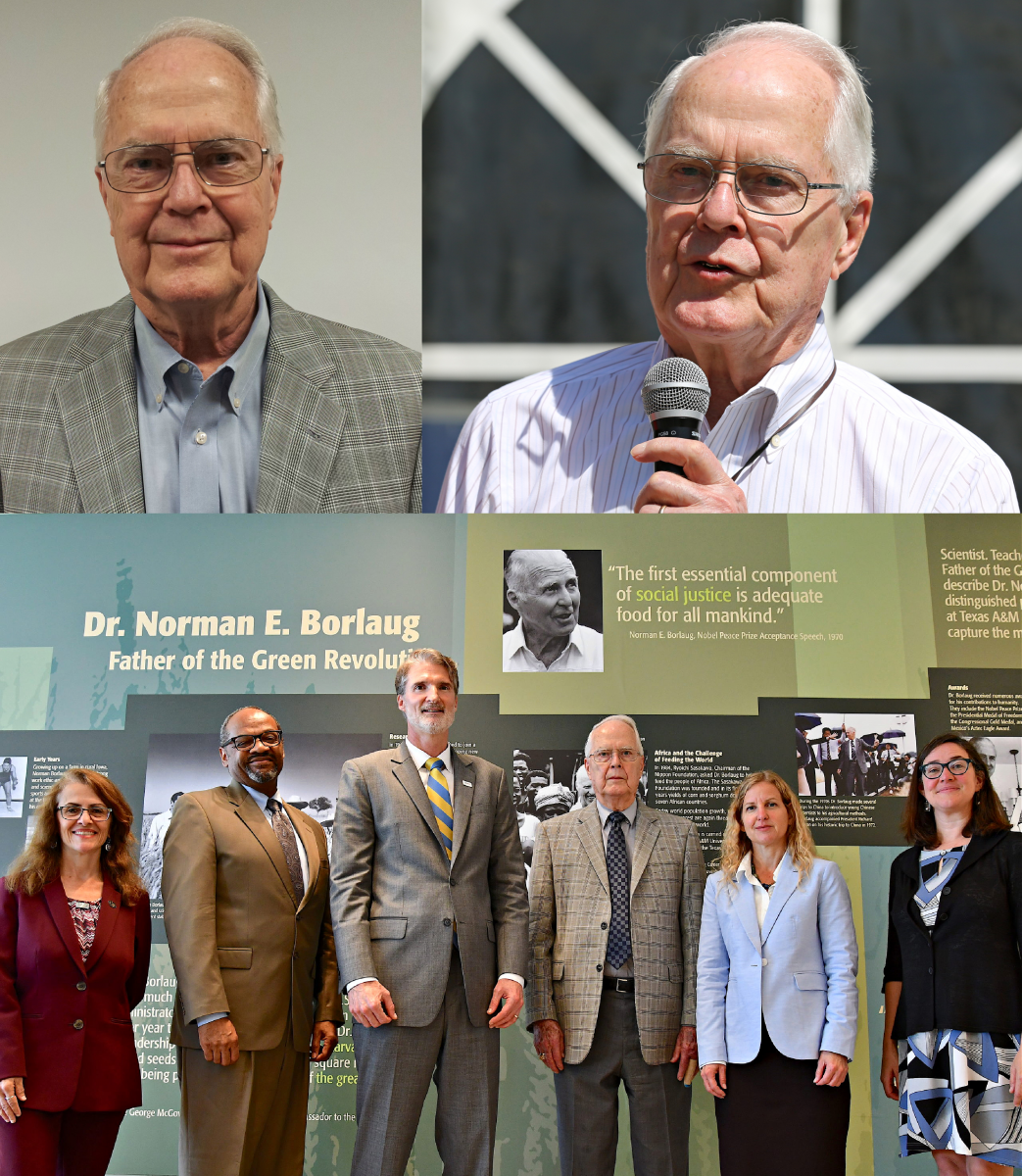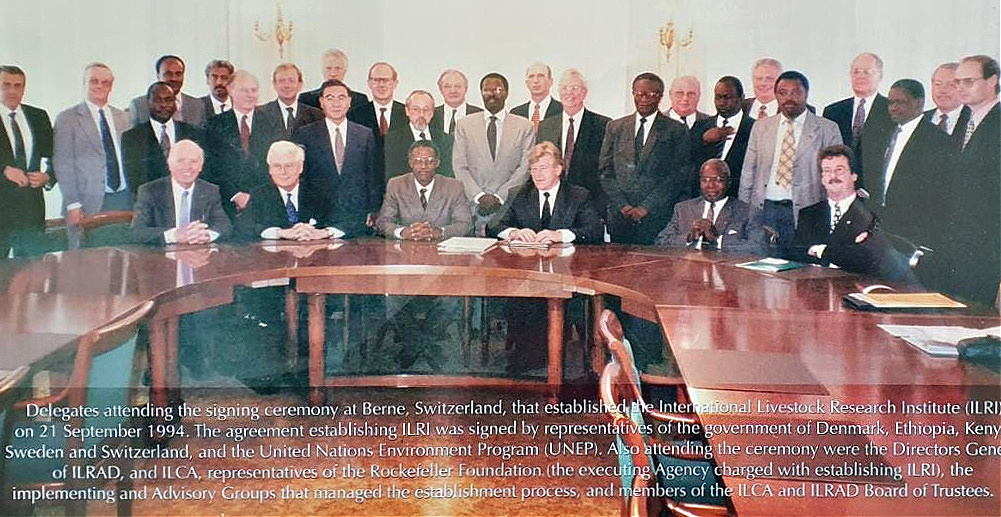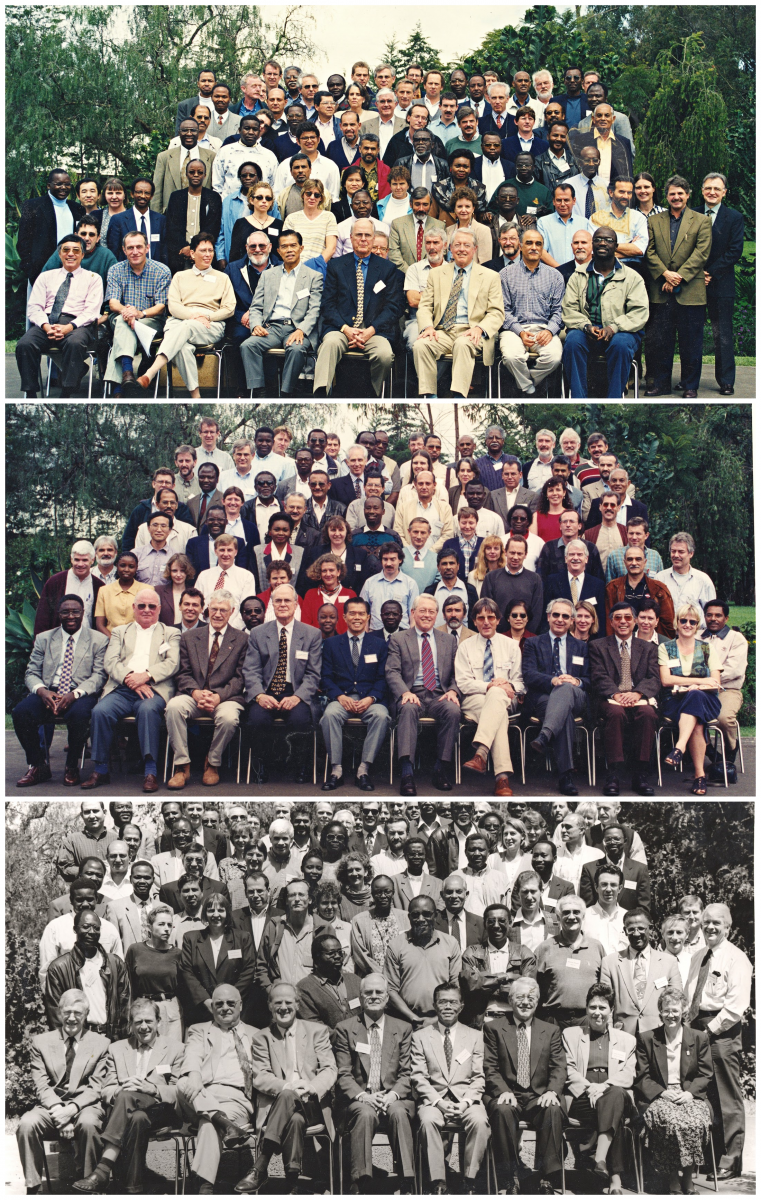
Neville Clarke
We are sad to report that Neville Clarke passed away last Friday, 11 February 2022, in Bryan, Texas, where, at the age of 91, he was still working full-time on international livestock-for-development issues, or, as his family at the International Livestock Research Institute (ILRI) tend to say, working for ‘better lives through livestock’.
Neville Clarke was a big man. Big in stature. Big in life. Big in agricultural science. Big in world development.
Impressively tall and with a back as straight and incorruptible as his moral intelligence and lifelong commitments, Clarke cut an imposing figure of expressed will and self-discipline throughout all his long life.

From left to right: Elsa Murano, current member of the ILRI Board of Trustees, associate vice chancellor for strategic initiatives in agriculture & life sciences at Texas A&M University, director emerita of the Norman Borlaug Institute for International Agriculture, and professor and president emerita of Texas A&M University; Eric Bost, associate director for external relations at the Borlaug Institute; USAID Counselor Chris Milligan; Neville Clarke, director of the Innovation Laboratory for Small Scale Irrigation, Borlaug Institute; Nicole Lefore, senior project manager at the International Water Management Institute; and Jennifer Long, USAID acting director for the office of agriculture, research and policy (photo by Texas A&M AgriLife Research/Blair Fannin).
Most certainly, Neville Clarke, who had earned his master of science and doctoral degrees in physiology from the University of Washington and his doctor of veterinary medicine degree from Texas A&M University, was big in the life, work and evolution of the International Livestock Centre for Africa (ILCA, headquartered in Ethiopia, 1974–1994), the International Laboratory for Research on Animal Diseases (ILRAD, headquartered in Kenya, 1973–1994) and the institute they joined to form in 1995, ILRI.
Clarke was appointed to the ILCA Board of Trustees in 1991 and succeeded Dieter Bommer as ILCA Board Chair in 1993. He had also served as USAID’s scientific liaison officer to ILRAD. In 1994, he became chair of the ‘ILRI Implementing Advisory Group’ of the ‘Implementing Agency’ for ILRI led by the Rockefeller Foundation. From 1995 through 1998 he served the new institute, ILRI, as board chair.

Delegates attending the signing ceremony establishing ILRI in Berne, Switzerland in 1994. Hank Fitzhugh, ILRI’s founding director general, is standing second from right with Neville Clarke, ILRI’s first board chair, standing next to him, fourth from right. Ross Gray, director general of ILRAD, stands at the back in the centre (twelfth from left and right).
As observed by Hank Fitzhugh, who was the last director general of ILCA (1993–1994) before it amalgamated with ILRAD, and the founding director general of ILRI during its first turbulent years (1995—2001), Neville Clarke’s role as chair of ILRI’s first board of trustees was critical to the survival, evolution, growth and success of ILRI.
Lindsay Falvey, a later chair of the ILRI Board of Trustees, agrees. ‘Neville lived a good life, and his contributions to international livestock research and development will remain a continuing legacy to a great man. ILRI would not have grown into the institution that it is today without Neville's earlier guiding and governing hand.’
Memorably and humbly, Clarke said the following twenty years after the establishment of ILRI during a 2014 event to mark ILRI’s anniversary: ‘The sweet spot was when ILCA and ILRAD merged. The sweeter spot is here and now, with research and development coming together.’
Clarke’s strengths in leadership and organization of large, interdisciplinary teams and organizations came as no surprise his former colleagues in the U.S. Air Force, in the US land grant university system or in the CGIAR system. Clarke had served as a colonel in the United States Air Force and directed its aerospace medical division (supporting NASA’s Mercury, Gemini and Apollo manned-spaceflight missions and aircrew protection against crash injury); later serving as associate dean for research in the college of veterinary medicine at Texas A&M University; director of the Texas Agricultural Experiment Station; executive director of the Southern Association of State Agricultural Experiment Station Directors (representing thirteen southeastern states); director of the Institute for Countermeasures against Agricultural Bioterrorism; and director of the Department of Homeland Security National Center of Excellence for Foreign Animal and Zoonotic Disease Defense.
At his death, Clarke was professor in the department of veterinary physiology and pharmacology in the college of veterinary medicine and biomedical sciences at Texas A&M University; senior fellow of the Borlaug Institute for International Agriculture, part of Texas A&M’s Agrilife Research agency special assistant for program development in the office of the vice chancellor for agriculture at Texas A&M; and director of the US Government’s Feed the Future Innovation Laboratory for Small Scale Irrigation, a project initiated in 2010 to benefit small-scale farmers of Ethiopia, Ghana and Tanzania.
USAID’s irrigation project, under Clarke’s leadership, which partners ILRI and two other CGIAR centres as well as many national universities and other institutions, received an additional USD12.5 million for a five-year extension in 2018. Clarke described the overall goal of his project as one to ‘transform subsistence farmers, who feed their families with what they grow, into small businesses with stable and sustainable incomes enhancing and ensuring quality of life.’ These were the kinds of things—reducing world poverty, increasing global food security, bettering humankind—that Clarke cared passionately about—and worked so ably all his professional life to bring about.
Fittingly, Neville Clarke’s long and distinguished career was defined by honours and awards, by prizes and grants, for his distinguished service, for his organizational abilities and unmatched work ethic and for his unflagging commitments to making the world a better, safer and more equal place for all people.
ILRI Director General Jimmy Smith well remembers, and is grateful for, the many organizational struggles that Neville Clarke and Smith’s predecessor as director general, Hank Fitzhugh, managed to overcome in joining two very different livestock institutes, which required integrating laboratory and field science and scientists, into the much larger and highly successful integrated institute ILRI has become. ‘Neville was a tough task master’, Smith recalls, ‘but a very good man and a highly committed partner who we will miss badly.’
Forever indebted to him, ILRI extends its heartfelt condolences to Neville’s children and grandchildren and to his many, many colleagues and friends in Texas and around the world.

Neville Clarke, ILRI Board Chair, sits in the front row of these group pictures of staff participating in ILRI’s annual program meetings in 1997 (bottom), 1998 (middle) and 1999 (top).
Note: If you would like to leave a condolence message, anecdote or tribute of any kind, please email these to Terry Muindi (t.muindi [at] cgiar.org) who will collect and forward them to relevant colleagues of Neville’s in Texas.





